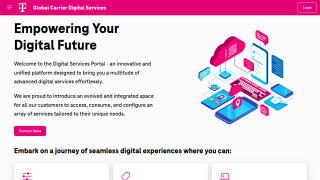
Opportunities are growing in the Middle East as demand for capacity continues to rise. Brendan Press, chief commercial officer at Qatar-based global cloud, connectivity and network enabler Gulf Bridge International (GBI), explains how his company is seeking to offer something diverse and different in the region.
What are GBI’s main focuses at the moment?
We want to stand out from the crowd, providing customers including carriers and over-the-top hyperscalers with an understanding of how GBI can offer capabilities different to other organisations.
We’re now focused on markets like Iraq and Iran, allowing us to provide routes that others can’t – and we really want to open up markets to give customers an alternative. Also, bigger players and consortia might have investments in subsea cables, but may not have the agility we have in terms of owning our own cables.
In addition, we’re focusing on service continuity, which is essential in the current landscape. By developing our network and offering protection as a service, it means we can more efficiently redirect customers in the event of cuts or outages.
How has the company been evolving its infrastructure?
We have a submarine cable network called the South Route that goes through the traditional pathway of the Red Sea up through Egypt – which carries more than 90% of data traffic between East and West.
We’ve now also developed our North Route through our investment in Iraq and our relationship with Iran. Not only does this give us diversity, but we also have significantly lower latency on this route. In Iraq, for instance, GBI recently enhanced its network, leveraging a wider range of terrestrial networks established by the company and its partners.
There’s a lot to do in the region in terms of working with governments and ensuring that pricing is working to make routes competitive against alternative ones. It’s also about ensuring that our partners’ local capabilities are upgraded from legacy technologies.
In what ways do such network developments help GBI to ensure service continuity?
What we’re trying to say to all our customers is that if there’s a fault on one of our routes, we’ll redirect them between our North and South routes. We want to provide that continuity whatever the situation.
The developments we’ve made mean that we don’t have to rely on other networks if there’s an issue and it avoids negotiations that can cause delays. In addition, of course, if we can keep more traffic on-net, then it’s better for us.
We’re also working with a number of parties on swap deals, so if a route goes down and they have a cable going the same way, then we can just swap over. We’re trying to always have an alternative, as otherwise it just causes more delays and stress for customers.
What learnings have you taken from providing support during the World Cup in Qatar at the end of last year?
There was a significant requirement for capacity during the World Cup. In light of this, the event lifted our horizons in meeting the requirements of the market well in advance of when they’re needed. It’s helped in terms of demand forecasting and our investment in technology.
We had to ensure that not only ourselves, but also our partner networks, were geared up 24/7 throughout the period of the World Cup to monitor, report and address issues as they happened. This set the bar of where we need to be as an organisation in terms of providing infrastructure.
What would you say are the other focuses of both GBI and the Middle East telecoms market at present?
We’re looking at how we’re going to evolve and integrate our business with the data centre world. We also have a relationship with a key OTT player in the Gulf and are looking to provide such services to all countries in the region rather than the content being accessed from Europe.
Given the advent of things like the metaverse and advances in gaming, meanwhile, low latencies are always going to be needed, and we can easily provide those locally.
With the digital transformation, it’s a very exciting time for the region. We’re looking to demonstrate that we are a consistently performing infrastructure player that provides capacity when you need it and prices that are competitive.




